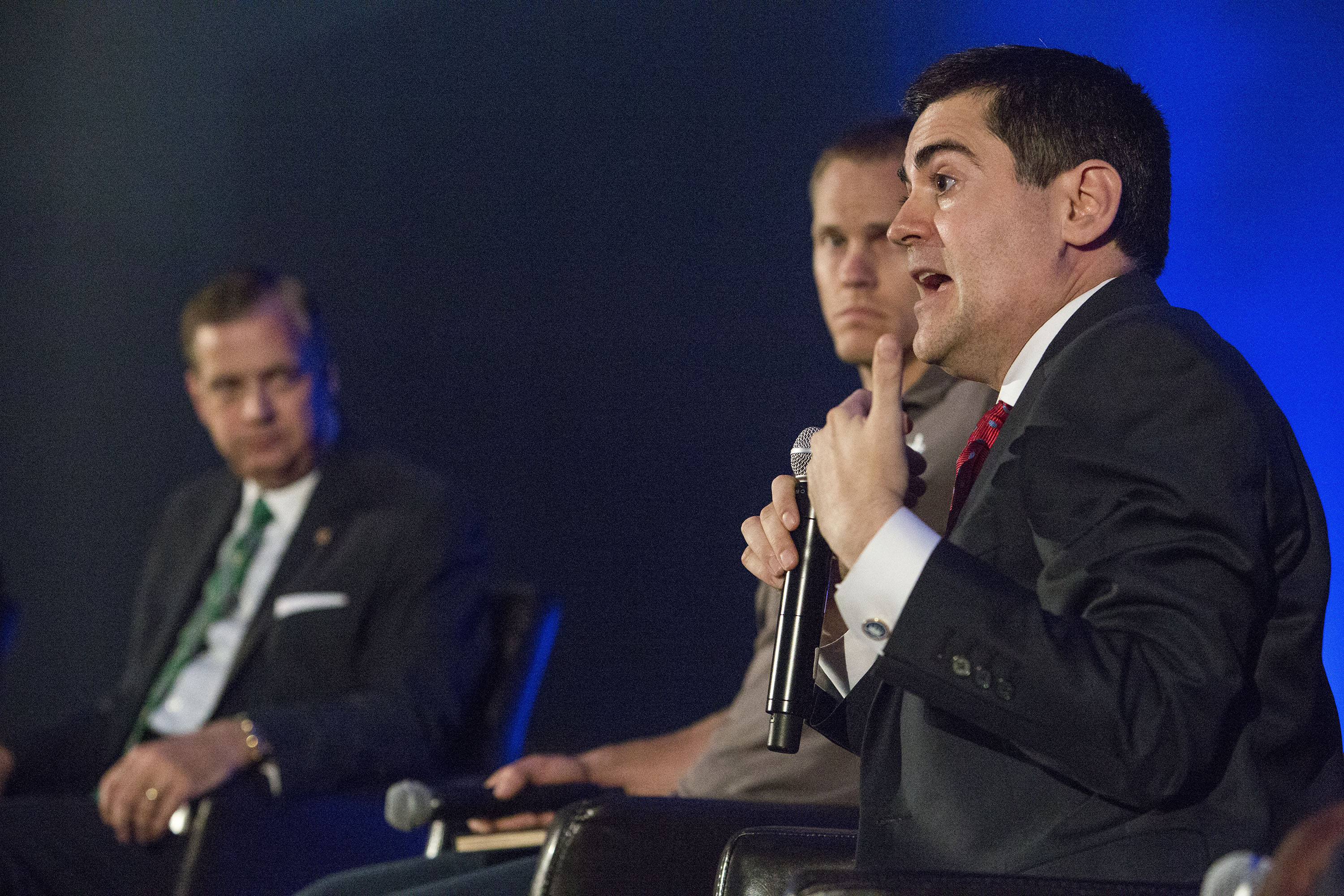
COLUMBUS, Ohio (BP) — Southern Baptists must remain resolute in the challenges of sexuality and gender while facing denominational decline and contend for religious liberty, panelists said during the Baptist21 luncheon in Columbus, Ohio.
 More than 1,000 people attended the sold-out event in the Greater Columbus Convention Center during the Southern Baptist Convention’s annual meeting. Jedidiah Coppenger, co-founder of Baptist21 and lead pastor of Redemption City Church in Franklin, Tenn., moderated the panel, which featured R. Albert Mohler Jr., Daniel Akin, Russell Moore; David Platt; and H.B. Charles Jr.
More than 1,000 people attended the sold-out event in the Greater Columbus Convention Center during the Southern Baptist Convention’s annual meeting. Jedidiah Coppenger, co-founder of Baptist21 and lead pastor of Redemption City Church in Franklin, Tenn., moderated the panel, which featured R. Albert Mohler Jr., Daniel Akin, Russell Moore; David Platt; and H.B. Charles Jr.
“The insinuation made in the secular media is that it is our position on sexual morality that will cost us cultural traction and cost us many members,” Mohler, president of The Southern Baptist Theological Seminary, said during the June 16 event, in regard to news reports speculating the decline of the SBC. “Our response to that is, ‘Probably, exactly right.'”
Mohler said the loss in membership numbers should be expected because of Southern Baptists’ stance against homosexuality. Southern Baptists, he said, should prepare to deal with the strengthened arguments suggesting that Christians can both be faithful and practice homosexuality or that it is an inevitable cultural loss to which churches must adjust.
“We certainly need to adjust to do more faithful ministry; we certainly need to adjust to be more Gospel-centered and Scripture-dependent, but there’s a limited amount of adjustment we can do,” Mohler said.
When asked about the upcoming Supreme Court decision on same-sex marriage, Akin said he expects the justices to rule against traditional marriage. The president of Southeastern Baptist Theological Seminary noted he will remain committed to train students biblically and theologically but will also help them deal with cultural sensitivities.
“Recognize that a short, sound bite answer for how you do ministry is simply not available,” Akin, said. “I’m going to give latitude to my brothers and sisters as they try to navigate this world within the very clear structural patterns and parameters provided by the Word of God.”
In light of the threats to religious liberty that such a decision would bring, Moore, president of the Ethics & Religious Liberty Commission, said Southern Baptists must go back to their roots as champions of religious liberty for all, not just the faithful majority. Southern Baptists must set religious liberty precedents now so they do not restrict religious liberty for themselves in the future, he said.
“We have to be back in touch with our heritage as Baptists with religious liberty, which was a heritage of looking out for everybody and it was making alliances with people issue by issue,” Moore said. “And one critically important thing for us to do is to work for religious liberty and tell the difference between persecution and insult.”
Mohler later revisited Moore’s comments on religious liberty, saying he fears many young evangelicals in the audience fail to appreciate just how serious this issue is for the sake of the Gospel. Contending for religious liberty is “tied to the preaching of the Gospel, it’s tied to our understanding of what it means to be made in the image of God, it’s central to understanding the freedom of the pulpit,” he said.
Panelists also discussed how to define sexual orientation and gender, referencing both Christians dealing with same-sex attraction and recent news about celebrity Bruce Jenner identifying as a woman named Caitlyn.
Platt, president of the International Mission Board, said, “Because this issue is so often tied up with identity in our culture, it’s really helpful to keep identity in Christ.”
“Instead of putting modifiers on types of Christians, ‘my life is in Christ,'” he said. “Persuasive biblical arguments so that faithfully walking through a Romans 1 kind of passage with pastoral sensitivity and biblical accuracy is the primary way to address this … and not to underestimate the sufficiency of God’s Word to handle issues like this in our culture.”
Mohler said the transgender movement stands in direct contradiction to a creation-based ethic, and that identifying the sex of a newborn in the delivery room is among the many problems facing the movement.
“Your essence is not just pronouns or even a name; it’s who God made you to be, who He knows you to be,” Mohler said. “And we cannot enter into the new vocabulary that’s demanded of us without abdicating the Gospel.”
Charles, the only panelist currently serving in the pastorate, said the challenges of defining sexuality and gender has led his church to revise bylaws to state clearly its positions on these matters.
“We are trying to make sure our members have biblical categories, and that we are very clear that we are not wavering on the authority of the Word of God,” Charles, pastor of Shiloh Metropolitan Baptist Church in Jacksonville, Fla., said.
Panelists also discussed the decline of evangelism in the SBC, the difference between marriages of same-sex and divorced couples, and practical ways to build multiethnic churches.
Pastors and messengers who registered for the event received nearly a dozen free resources, including SBC President Ronnie Floyd’s book “Forward,” SBTS Press’ “A Guide to Church Revitalization” and Southern Seminary professor David Prince’s book “Church with Jesus as the Hero.”
For more information on Bapist21, including a video recording of the panel, visit www.baptisttwentyone.com. B21 focuses on addressing issues relevant to Southern Baptists in the 21st century.
















